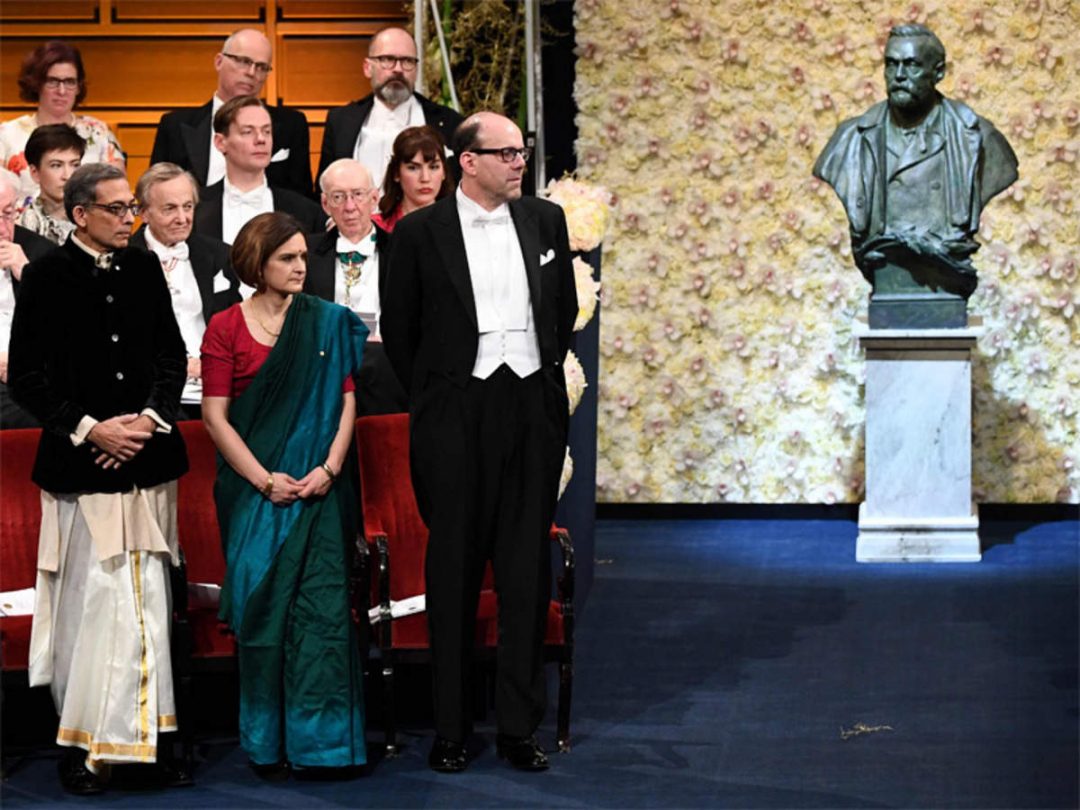Dressed in bandhgala and dhoti, Abhijit Banerjee Esther Duflo in a blue sari and Michael Kremmar in Nobel Prize 2019 ceremony
Abhijit Banerjee is the second Indian after Amartya Sen to win the Nobel prize in Economics. Banerjee, Esther Duflo and Michael Kremmer together helped obtain reliable answers about the best ways to fight global poverty.
Clad in a bandhgala punjabi and a dhoti, as Abhijit Vinayak
Banerjee stepped onto the dais at Stockholm Concert Hall in Sweden on
Tuesday afternoon — along with his wife Esther Duflo and colleague
Michael Kremmer — to receive the Nobel Prize for their research in
economics, the city, too, rose in unison in front of their TV sets just like the
hundreds of delegates at Konserthuset, Stockholm, some 6,750kms away.
“This is what sets him apart. At the grandest stage of all, he is holding up
Indian tradition. Apart from what he has achieved in his field, these small
gestures set him apart from others and make us more proud of him. It was
a wonderful moment for us, watching our childhood friend, Jhima, receive
the honour and write history in his own right,” said Bappa Sen.
Dressed in a bandhgala jacket and dhoti, Indian-American Economist Abhijit Banerjee received the Nobel Prize in Economics in Sweden for his “experimental approach to alleviating global poverty.” Esther Duflo, who shared the prize, was dressed in a blue sari. Their colleague Michael Kremmer, meanwhile, wore a suit.
The award carries a purse of 9 million Swedish krona (about Rs 6.5 crore) to be shared among the three winners.
Born in Mumbai, Banerjee is the second Indian after Amartya Sen to win the Nobel prize in Economics. Like Sen, Banerjee, too, is an alumnus of Presidency College, now Presidency University.
While the couple, Banerjee and Duflo, are professors in the department of economics at the Massachusetts Institute of Technology (MIT), Kremer is a professor in the department of economics at Harvard University.
Watch Abhijit Banerjee, Esther Duflo and Michael Kremer receive their medals and diplomas at the #NobelPrize award ceremony today. Congratulations!
They were awarded the 2019 Prize in Economic Sciences “for their experimental approach to alleviating global poverty.”
The trio’s research has, over the last two decades, helped obtain reliable answers about the best ways to fight global poverty. Their work has revolved around identifying “low-hanging fruits”, which are often the most effective interventions in improving outcomes in health and education for the poor.
Their work — breaking down the problem of global poverty into a number of smaller and more precise questions at individual and group level — has redefined research in development economics over the last 20 years. “This new research is now delivering a steady flow of concrete results,” stated the popular science background paper made available by the Academy.
Days before the award, Banerjee had blamed “recentralisation” as among the reasons compounding India’s economic slowdown and had advised the government to strengthen institutions, removing interference by the Prime Minister’s Office (PMO) and withdraw cases “that look obviously politically motivated”. Incidentally, he was also one of the few faces that the Congress tapped ahead of the Lok Sabha elections this year.


